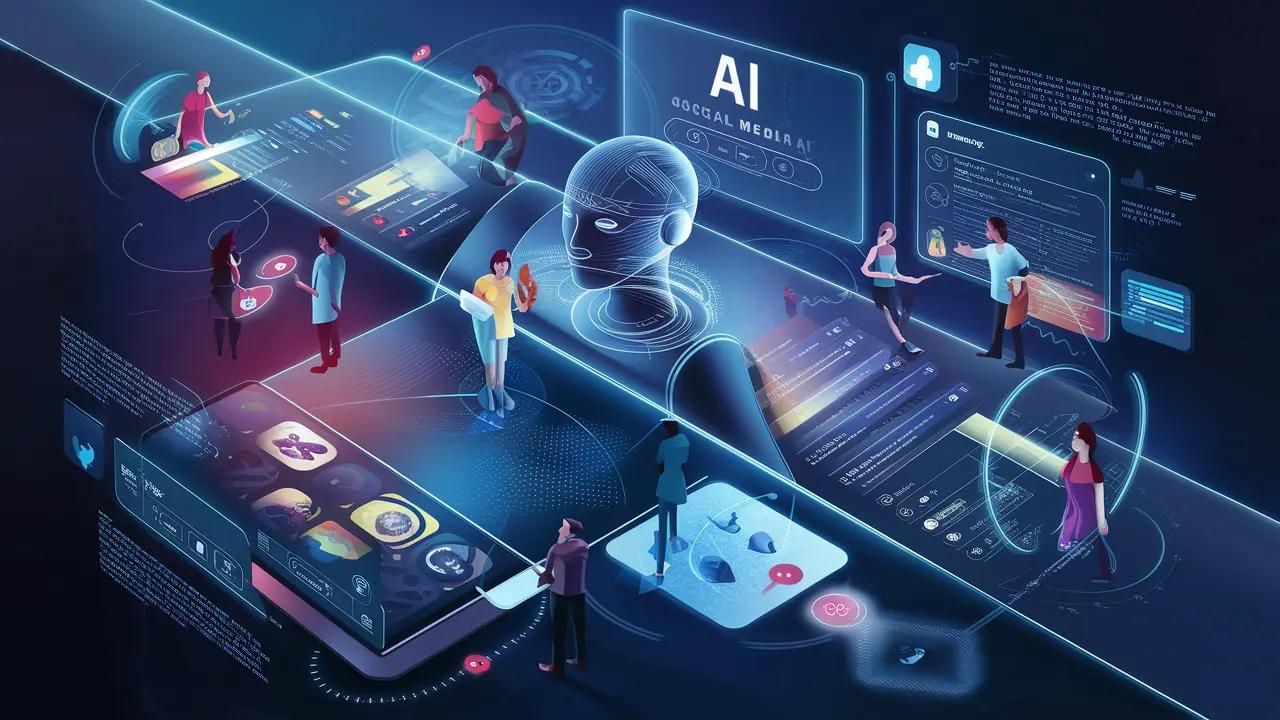May 28, 2024|6 min reading
AI in Social Media: Enhancing User Experience and Addressing Challenges

Artificial intelligence (AI) is revolutionizing various industries, including social media. From creating marketing campaigns to moderating content, AI's influence is omnipresent, often working behind the scenes to enhance user experiences and streamline operations. This blog delves into the role of AI in social media, exploring its benefits, applications, and the challenges it presents.
What is Artificial Intelligence?
Artificial intelligence refers to the simulation of human intelligence in machines designed to think and act like humans. These systems can recognize patterns, make decisions, and perform tasks that typically require human intelligence. In social media, AI is instrumental in automating processes, personalizing content, and providing insights that drive strategic decisions.
Benefits of AI in Social Media
Personalized Content Recommendations
AI algorithms analyze user behavior to deliver personalized content. By understanding user interactions, AI suggests posts, pages, and advertisements that align with individual preferences, increasing engagement and user satisfaction.
Content Moderation and Security
AI enhances security by identifying and removing harmful content. Advanced algorithms detect spam, hate speech, and inappropriate images, ensuring a safer online environment. Additionally, AI prevents data and identity theft by monitoring suspicious activities.
Improved Customer Service
AI-powered chatbots offer 24/7 customer service, responding to inquiries and resolving issues efficiently. These chatbots enhance user experience by providing timely and accurate support, freeing up human resources for more complex tasks.
Enhanced Marketing Strategies
AI helps businesses optimize their marketing strategies. By analyzing historical data and user behavior, AI can predict trends and suggest effective marketing tactics. This leads to higher engagement rates, more leads, and improved return on investment (ROI).
Applications of AI in Social Media
Content Creation and Curation
AI assists in content creation by analyzing user interests and trends. It helps marketers create content that resonates with their audience, ensuring higher engagement. AI also curates content by selecting relevant posts that match user preferences.
Social Listening
AI-powered social listening tools track and analyze conversations across social media platforms. This helps businesses understand public sentiment, identify trends, and respond to customer feedback promptly.
Ad Targeting and Optimization
AI optimizes ad targeting by analyzing user data to deliver relevant advertisements. This increases the likelihood of conversions and improves the effectiveness of marketing campaigns. AI also helps in scheduling and posting ads at optimal times to maximize reach.
Facial Recognition and Image Analysis
AI enhances image recognition capabilities, allowing platforms to tag users in photos automatically and filter inappropriate content. This improves user interaction and maintains community standards.
Challenges of AI in Social Media
Privacy Concerns
The extensive use of AI raises significant privacy issues. Social media platforms collect vast amounts of personal data to personalize content and advertisements. Ensuring data protection and addressing privacy concerns is crucial to maintaining user trust.
Spread of Misinformation
AI can inadvertently contribute to the spread of misinformation. While it helps in identifying and removing false information, it can also amplify it if not properly managed. Monitoring and mitigating the spread of misinformation is a continuous challenge.
Bias and Discrimination
AI algorithms can exhibit biases based on the data they are trained on. This can lead to discriminatory practices and unfair treatment of certain groups. Ensuring fairness and transparency in AI systems is essential to prevent bias.
Lack of Human Touch
AI-generated content can lack the emotional depth and creativity that human-created content offers. While AI can automate many tasks, it cannot fully replicate the nuance and empathy that humans bring to content creation and interaction.
How Social Media Platforms Utilize AI
Facebook uses AI to suggest friends and content, recognize faces in photos, and improve ad targeting. Its AI algorithms analyze user behavior to enhance the overall user experience and ensure content relevance.
Twitter employs AI to categorize tweets, suggest replies, and detect fraudulent activities. AI also optimizes photo cropping based on user eye-tracking data, enhancing visual appeal.
Instagram leverages AI to customize the Explore tab, suggesting accounts and content based on user interactions. This personalization increases user engagement and satisfaction.
TikTok
TikTok's AI-driven recommendation algorithms are central to its user engagement. By analyzing user behavior, TikTok suggests content that aligns with individual preferences, driving high levels of interaction and content consumption.
Final Thoughts
AI in social media offers numerous benefits, from personalized content and improved security to enhanced marketing strategies. However, it also presents challenges such as privacy concerns, misinformation, and potential biases. As AI continues to evolve, it is vital to address these challenges and ensure ethical and transparent use of AI in social media. With proper safeguards, AI can significantly enhance the social media experience, making it more engaging, safe, and enjoyable for users.
Explore more

Unlocking the Mind: How AI Reconstructs Thoughts with Medical Imaging
Discover how combining medical imaging and diffusion models can reconstruct images of thoughts. Explore the fascinating ...

NVIDIA: Leading the AI Revolution
Discover how NVIDIA is pioneering the AI revolution, transforming industries with advanced GPU technology and ethical AI...

Will AI Replace Programmers and Software Engineers? Future of Coding Jobs
Discover if AI could replace programmers and software engineers. Explore the impact, benefits, limitations of AI in pro...
